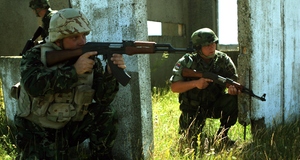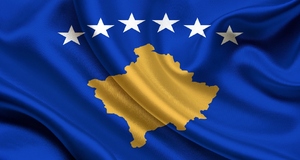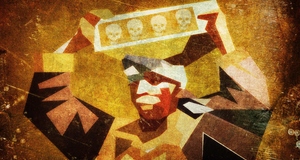From Interstate - Journal of International Affairs VOL. 1998/1999 NO. 2What Reasons Do We Have to Bomb Serbia?
By
Interstate - Journal of International Affairs 1999, Vol. 1998/1999 No. 2 | pg. 1/1
KEYWORDS:
Once again, President Slobodan Milosevic has demonstrated his impunity towards the will of the international community. After prosecuting unsuccessful wars of aggression against Slovenia, Croatia and Bosnia-Hercegovina, the tanks of the JNA (Yugoslav Peoples Army) have, once again, turned upon the Albanian inhabitants of Kosova. In contravention of the October agreement, which averted the threat of NATO airstrikes on Serb military positions, the Serb forces have restarted their offensives against the Kosova Liberation Army (KLA), and civilian Albanians. This brief paper intends to show that the Yugoslav President, Slobodan Milosevic is a war criminal, with whom the West can not and should not negotiate. Instead, as has been argued elsewhere, the international community should see the Serbian leadership as the nub of the problem, rather than part of the potential solution. Most works which trace the break up of Yugoslavia begin their narrative in Kosova. Serbs trace the history of their so-called ancient homeland to the medieval kingdoms of the eleventh and twelfth centuries. The most significant date in this history is 1389, the year of the infamous battle of Kosovo Polje, in which, it is reputed by Serbian nationalist sages, the armies of King Lazar were (gloriously) defeated by the Ottoman Turks. This battle has been mythologized to such an extent by Serbian nationalists that it is difficult to know what really happened. There are two things we do know, however. Firstly, the anti-Ottoman armies were not made up of Serbs alone. Indeed, it is widely thought that the armies of the Bosnian king, Stephen Tvrtko were more powerful than Lazar’s, and put up more resistance. It is also known that the armies consisted of substantial numbers of Croats and Hungarians. Secondly, far from being a crushing defeat, the battle is generally thought to have resulted in a ‘score-draw’ (to quote Noel Malcolm), and that in-fighting between different Serbian noble families lead to the eventual demise of the Serbian kingdom some years later. Nevertheless, such historical vagaries do not interest the Serbian nationalist ideologues who proclaim that Kosova was Serbian, is Serbian, and always will be, regardless of the fact that ninety percent of the population desire independence. The rise of Milosevic, from anonymous apparatchik to nationalist demagogue, was intimately linked with the problems in Kosova. During the time of Tito’s Yugoslavia, Kosova was made an autonomous province of the Republic of Serbia, with its own seat on the collective presidency and a substantial degree of self-government. Between 1987 and 1989, Milosevic successfully manoeuvred himself into a powerful position within the Serbian League of Communists, by denying the delicate national balancing act performed by Titoism, and demanding a greater role for Serbia within the federation. Milosevic used the five hundredth anniversary of the battle of Kosova to tell the Serbs of Kosova that, ‘no-one has the right to beat you’, and to proclaim that the Serbs should retake control of the province from the Albanians, who, according to the hysterical nationalists bolstered by an equally hysterical media, raped Serb women (and men), excluded Serbs from public life and threatened a complete genocide of the Serbian nation in Kosova. As a result of the rise of Milosevic, Kosova lost its autonomy. The system employed by the Serbs in Kosova reflected the South African apartheid system. The Albanian university in Pristina was closed down, the few Albanians who occupied public posts were removed, freedom of speech was curtailed and Albanians were frequently arrested and physically abused. Whilst the Serbs launched wars of aggression against Slovenia and Croatia, which included the butchery of Vukovar in which two hundred Croatian hospital patients were murdered by Chetnik Serb militia’s, the Albanians, headed by Rugova, engaged in a Gandhi-esque strategy of non-violent civil resistance in the hope that the international community would address their grievances in the final peace agreement. The Albanians also refrained from assisting the Bosnians when lzetbegovic requested that they create a second front against the Serbs, despite the atrocities committed by the Serbs in Srebrenica, Saraj’evo and Omarska to name but three. This they did in the belief that war could be avoided, since the international community would ensure their survival, as it had done successfully in neighbouring Macedonia. However, the Dayton agreement of 1995, which emerged as a result of concerted international pressure upon Milosevic and the indicted criminal Karadzic, did not address the Kosova question at all. Between 1995 and 1998 the conditions endured by the Albanians worsened. Freed of its other war commitments, the Serbian JNA poured resources and men into the province in order to bolster the apartheid system, and to prevent expressions of dissatisfaction. The failure of the international community to address the Kosova problem hardened opinion there. Support for passive resistance crumbled, and the Albanian majority moved away from supporting the idea of an autonomous Kosova within the new Yugoslavia, towards a concerted desire for independent statehood. By failing to address the constitutional problem posed by Kosova, the international community has ensured that that the Kosovans must fight in order to secure their political objective. One lesson that the KLA has leamt from the wars in Slovenia, Croatia and Bosnia-Hercegovina is that the international community tends to recognise control over land taken by force. Slovenia and Croatia were recognised only after they had proved that they could defend themselves against the JNA, and Republika Srpska in Bosnia is nothing other than a land carved out by the politics of ethnic cleansing. Time and again Milosevic has made agreements, only to break them before the ink on the paper has dried. The President recognises that the West does not support the objectives of the KLA, and that unlike in the case of Iraq, there is no will amongst NATO members to take action, despite considerably greater support from the Russian government than was offered for the bombardment of Iraq. The moral case for action is clear. The very nature of the regime in Kosova is undemocratic and illegitimate. It is a regime based on the fear and repression of the majority perpetuated by a well armed and powerful minority. The actions committed by the JNA and Serbian ‘police force’ in September/October last year and January this year constitute gross violations of the United Nations Charter, Geneva Convention and the Helsinki Final Acts of the OSCE, The Universal Declaration of Human Rights and Article 2 of the Genocide Convention, to which Yugoslavia is a signatory. The specific legal case for action, in response to the massacre at Racak in January 1999 is also clear. Security Council Resolution 1199 provides clear authorisation for an extensive use of force against Serbian military positions, and the October protocol signed by Slobodan Milosevic, last year, provides NATO with substantial authorisation to use force, ostensibly for the protection of the unarmed OSCE observers. Whilst the moral and legal imperatives for action are clear, numerous obstacles have been erected by experts. Firstly, many observers point out that the KLA want independence from Yugoslavia, and to eventually unite with Albania. This, they argue, would destabilise the whole region. Macedonia would descend into war and would eventually be partitioned between Albania, Bulgaria and Greece, and Turkey would intervene on behalf of their Muslim brethren, leading to an all-out Greco-Turkish war which would destroy the unity of NATO. Hence, any action against the Serbs would strengthen the KLA, and as such would be undesirable. This observation, though, is highly problematic. Firstly, we should remember that the Kosovar Albanian stance on the issue was hardened precisely because the international community saw them as terrorists with illegitimate claims, and thus failed to address the issue until 1998. A case of the selffulfilling prophecy? Secondly, Balkan escalation theories, which abounded during the wars in Bosnia-Hereegovina have been united by their abject failure of prophecy. The Slovenian war did not spread to Croatia, Austria and Hungary. The Croatian war did not spread to Serbia and Bosnia-Hereegovina, and the war in Bosnia-Hercegovina did not spread to Kosova or Sandzak. The idea that Macedonia will be fatally destabilised by the Kosovan conflict bears no resemblance to United Nations reports, which indicate that the Albanians and other Muslims in Macedonia do not want secession, and that the republic is actually remarkably stable. Furthermore, the notion that Bulgaria will attempt to grab some land from another state owes more to nineteenth century logic than to the logic of an integrating Europe in which the Bulgarian government is more interested in establishing beneficial financial links with the EU, than in embarking on an expansionist odyssey reminiscent of the 1912-3 Balkan wars. Finally, the suggestion that Greece and Turkey will go to war over Kosova is absurd, given that even the Cyprus question has not led to all-out war. Secondly, many on the left wing of the Labour Party (such as Tony Benn) and in the policy making circles of the Conservative Party (Douglas Hurd, for example) exhibit a Rebeeca West style, romanticist, understanding of the Serbs, as plucky warriors. This manifests itself in two ways. Firstly, those such as Benn and Hurd (who, incidentally was rewarded with a large bonus from his employers, Nat West, for handling the negotiations for a lucrative agreement whereby Nat West handled the financial aspects of the privatisation of the Serbian Telecommunications Company) argue that the ,plucky’ Serbs fought on the side of the allies during World War 11 (it should be noted that Tito was a Croat), and had serious grievances under Communism which needed to be addressed. These ‘plucky fighters’, then, need to be understood rather than condemned. I do not need to go to great lengths to show that this view is inaccurate. During World War 11, Serbia was a fascist puppet state headed by General Nedic. The anti-fascist partisans were not made up solely of Serbs, but of all the nationalities of Yugoslavia — at the end of the war five of the eight Partisan divisions were made up solely of Croats. As for grievances about Yugoslavia, it should be noted that ninetyeight percent of JNA officers were Serbs, they made up the bulk of the Communist Party hierarchy, and the central government invested, per-capita. more than thirty percent more in Serbia than it did in Croatia or Slovenia. The second manifestation of this argument appears in the military circles. The argument follows that these plucky Serbs, unlike the Iraqis, are very well equipped and could exert innumerable losses upon the Western allies. Whilst this assessment is correct, in terms of the Yugoslav army possessing large amounts of weapons, three points need to be borne in mind. Firstly, most of this equipment is of at least second generation Soviet capacity, and the Yugoslav armed forces are certainly no more sophisticated than the Iraqi forces. Secondly, the evidence is that the JNA is not a terribly effective fighting force. It took them three months to take Vukovar, despite throwing everything they had — including Napalm — at this East Slavonian city, and they have not been entirely successful against the lightly armed KLA. Thirdly, the evidence suggests that, beneath the rhetoric, Milosevic understand the language of force. As soon as NATO appeared serious about the substantial use of force in Bosnia, Milosevic capitulated and the Dayton agreement was secured. Milosevic, incidently, still does not believe that the international community is serious about taking affirmative action in Kosova, and so he continues in his policies of apartheid and ethnic cleansing. If he is forced to back down on Kosova, Milosevic could lose his nationalist powerbase to extremists such as Seselj. As such, as long as the international community appears half hearted in its policy towards Kosova, Milosevic will continue to pursue his objectives, which includes the pursuit of ‘Greater Serbia’. It is not enough to indict individual soldiers for war crimes, such as the atrocious act committed at Racak. Milosevic must bear responsibility for supporting apartheid and ethnic cleansing, and for harbouring indicted criminals such as Arkan and Mladic. Milosevic has shown time and again that he is a brutal murderer. It is time for the international community to stop seeing him as part of the solution, and to start seeing him as the problem. The emancipation of the Kosovar Albanians, who reside only two and a half hours from London, will not lead to a fourth Balkan war. Their continued subjugation to this oppressive regime undoubtedly will. Suggested Reading from Inquiries Journal
Inquiries Journal provides undergraduate and graduate students around the world a platform for the wide dissemination of academic work over a range of core disciplines. Representing the work of students from hundreds of institutions around the globe, Inquiries Journal's large database of academic articles is completely free. Learn more | Blog | Submit Latest in International Affairs |



















